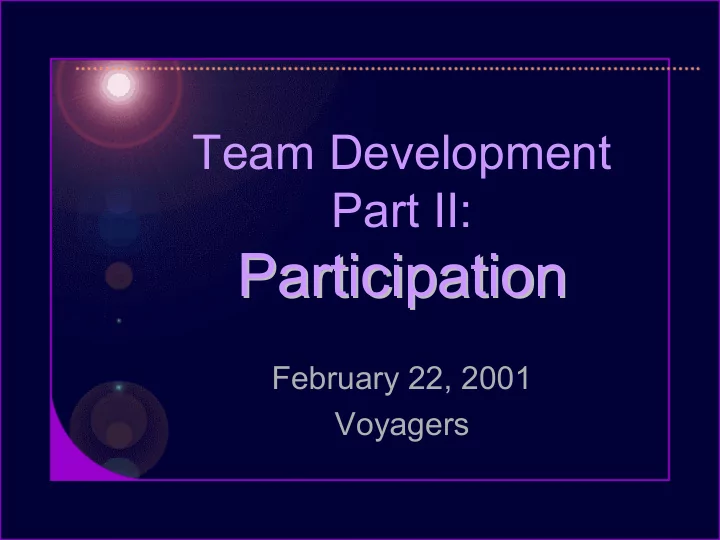

Team Development Part II: Participation Participation February 22, 2001 Voyagers
Question? Question? • Which skills/ideas from last week’s workshop have you applied most successfully this week? • Which skills/ideas have had the greatest impact on your team ? • Which skills/ideas have had the greatest impact on your job ?
Objectives Objectives • Define characteristics of effective meetings • Identify task (practical) and process (personal) communication methods used by team members. • Identify the roles and responsibilities of team members • Commit to the Meeting Code of Conduct • Participate in a team activity
Program Norms Program Norms • Informal & interactive • Maintain and enhance self-esteem • Listen to understand, respond with empathy • Avoid nitpicking • Ask for help & encourage involvement • Be prompt & prepared • HAVE FUN!!
Effective Meetings Effective Meetings
Effective Meetings Effective Meetings • Provide Information • Brainstorming/generate ideas • Collecting opinions and information • Set goals and plan actions • Review progress or status • Identify and solve problems • Make decisions • Resolve conflicts of interest
VIDEO VIDEO
What did the meeting members do, or fail to do, that made the meeting ineffective?
Meetings Needs... Meetings Needs... Task Needs Process Needs • To make good • To feel valued and decisions and plans respected • To focus on the • To be listened to meeting topic • To finish on time • To have a chance to contribute to the discussion
Team Member Roles Team Member Roles “Task” types ask: “What?” and “Why?” “Process” types ask: “How?”
“Task” Communication “Task” Communication “I Think that…” • Analytical • Auditory • Verbal • Linear • Concrete • Explicit • Active
“Task” Roles “Task” Roles • Information giver • Information seeker • Opinion giver • Elaborator • Clarifier • Standard setter
“Process” Communication “Process” Communication “I Feel that…” • Intuitive • Spontaneous • Emotional • Visual • Artistic • Playful
“Process” Roles “Process” Roles • Encourager • Gatekeeper • Listener • Harmonizer • Accepter • Supporter
Dysfunctional Team Behaviors Dysfunctional Team Behaviors • Condescending • Bullying • Avoiding • Withdrawing • Joking • Dominating
Responses to Dysfunctional Responses to Dysfunctional Behavior Behavior • The team provides individual counseling. – “When you do/did this… I felt this way… as a member of this team I would like to ask that you …” • The team confronts the individual (with guidance from Team Leader).
Meeting Code of Conduct Meeting Code of Conduct • Set date, time, location and required resources for meeting (utilizing Lotus Notes) • Have an agenda, stick to agenda, stay on subject matter • Be on time • Come prepared • Everyone participates • One person speak at a time • No “Side Bar” conversations • Keep track of “Action Items” • Utilize “Parking Lot” for side issues • Avoid interruptions • End on time
Team Activity Team Activity “Team Responsibilities”
Recommend
More recommend